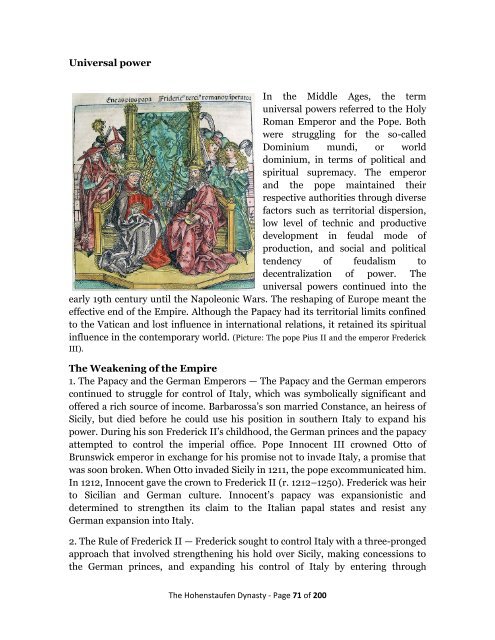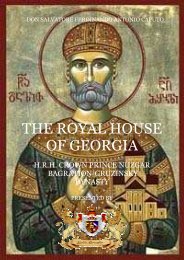here - Nobility Associations
here - Nobility Associations
here - Nobility Associations
You also want an ePaper? Increase the reach of your titles
YUMPU automatically turns print PDFs into web optimized ePapers that Google loves.
Universal power<br />
In the Middle Ages, the term<br />
universal powers referred to the Holy<br />
Roman Emperor and the Pope. Both<br />
were struggling for the so-called<br />
Dominium mundi, or world<br />
dominium, in terms of political and<br />
spiritual supremacy. The emperor<br />
and the pope maintained their<br />
respective authorities through diverse<br />
factors such as territorial dispersion,<br />
low level of technic and productive<br />
development in feudal mode of<br />
production, and social and political<br />
tendency of feudalism to<br />
decentralization of power. The<br />
universal powers continued into the<br />
early 19th century until the Napoleonic Wars. The reshaping of Europe meant the<br />
effective end of the Empire. Although the Papacy had its territorial limits confined<br />
to the Vatican and lost influence in international relations, it retained its spiritual<br />
influence in the contemporary world. (Picture: The pope Pius II and the emperor Frederick<br />
III).<br />
The Weakening of the Empire<br />
1. The Papacy and the German Emperors — The Papacy and the German emperors<br />
continued to struggle for control of Italy, which was symbolically significant and<br />
offered a rich source of income. Barbarossa’s son married Constance, an heiress of<br />
Sicily, but died before he could use his position in southern Italy to expand his<br />
power. During his son Frederick II’s childhood, the German princes and the papacy<br />
attempted to control the imperial office. Pope Innocent III crowned Otto of<br />
Brunswick emperor in exchange for his promise not to invade Italy, a promise that<br />
was soon broken. When Otto invaded Sicily in 1211, the pope excommunicated him.<br />
In 1212, Innocent gave the crown to Frederick II (r. 1212–1250). Frederick was heir<br />
to Sicilian and German culture. Innocent’s papacy was expansionistic and<br />
determined to strengthen its claim to the Italian papal states and resist any<br />
German expansion into Italy.<br />
2. The Rule of Frederick II — Frederick sought to control Italy with a three-pronged<br />
approach that involved strengthening his hold over Sicily, making concessions to<br />
the German princes, and expanding his control of Italy by entering through<br />
The Hohenstaufen Dynasty - Page 71 of 200



